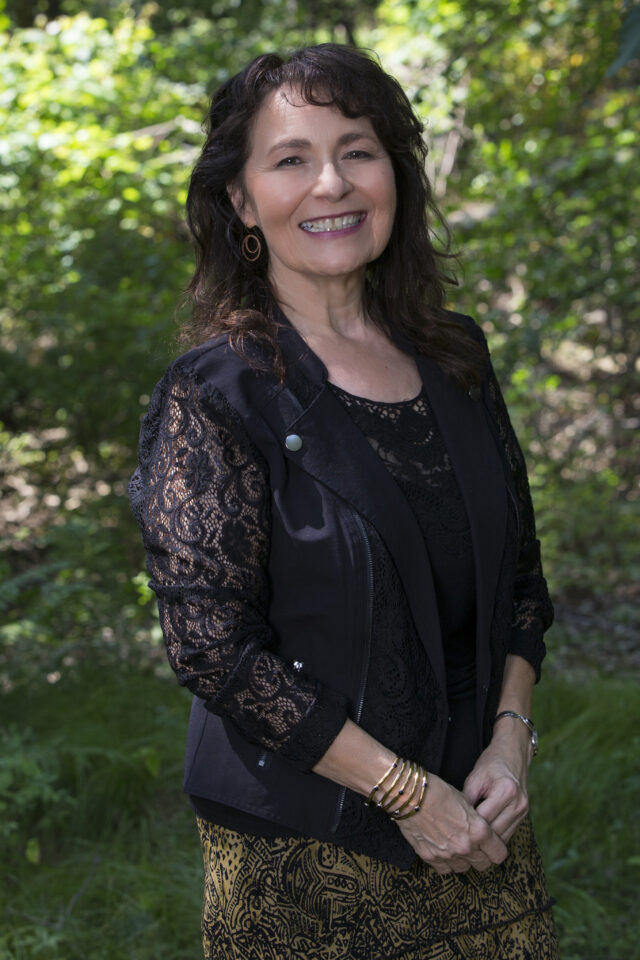Short Story Award Winners – Agency Review
WINNER – “Leaving Paradise” by Kimberly Blaeser
A wonderfully evocative, sharply detailed, and tender, vibrant story about life on the Rez, in the Anishinaabeg village of Polecat Lake, written in sentences prismatic with allusion and mystery, and a story that moves agilely from one tantalizing, half-glimpsed revelation to another. “Kids with a tentative grip on home,” the narrator writes, “we didn’t never expect answers and explanations.” —Guest Judge Colin Barrett

I understood it even then. All that could have happened, but didn’t. Some paths on the reservation once followed can never be retraced. Indian boys don’t get to be boys. They get marked young.
Contact Information: kblaeser@uwm.edu
Biographical Statement:
Though I am known primarily as a poet, I have always written and published in several genres. In 2023, during a writing residency, I fell deeply into the fiction work I am immersed in now.
I am Anishinaabe, an enrolled member of the White Earth Nation, and grew up on the reservation in northwestern Minnesota. I spend part of each year in a water-access-only cabin adjacent to the Boundary Waters Canoe Area Wilderness (BWCAW). Connections to my Indigenous culture informs my writing as does the ethos of Northwoods and rural/small town life.
I am past Wisconsin Poet Laureate and the founding director of Indigenous Nations Poets. My six poetry collections include Ancient Light (2024), Résister en dansant/Ikwe-niimi: Dancing Resistance (2020), and Copper Yearning (2019). I am an MFA faculty member at Institute of American Indian Arts, Professor Emerita at UW–Milwaukee, and was 2024 Lois and Willard Mackey Chair in Creative Writing at Beloit College.
Among my honors are the 2025 Poets and Writers’ Writer for Writers award and a Lifetime Achievement Award from Native Writers’ Circle of the Americas. In 2024, my fiction was selected as First Runner Up in the Maureen Egen Writers Exchange Award. My story, “Vision Confidence Score,” won the Zona Gale Short Fiction Award from the Council of Wisconsin Writers in 2020 and was also selected as Honorable Mention in the 2018 Rick DeMarinis Short Story Contest. Since publication also often involves performance, if you are interested in viewing past readings, some links are provided here.
Current Projects:
My current literary short fiction project Red Ants is a collection (63,000 words) that contains eighteen stories. Red Ants centers Anishinaabe experience in a time period that ranges from the 1950s to an unspecified Indigenous future. The characters bring the traditional tribal stories and teachings they carry into new spaces, into their contemporary experiences. My fiction reflects the clashes, the code-switching, and the comedy that results. For example, “Vision Confidence Score” was described by judge Hasanthika Sirisena as “a mad dive into our times. Its particular and substantive intelligence is the way it interrogates how our surveillance state has reshaped our understanding of identity, all while using language in novel and exciting ways.”
In “Waiting,” which was published 2024 in Kenyon Review (audio here), five high school friends narrate an interconnected story that involves everything from drugs and attempted suicide to ghosts and sidewalk art. This story depicts the darker side of reservation life including the powerless “waiting” young Anishinaabeg face and their jaded early understandings of survival tactics as when Wally in the story reflects: “I wanted Lanie safe. We all did. But did we want it like a tire iron wants peace, like a gun does?”
In the title story, “Red Ants,” two teenagers confront the blood-quantum requirement that disenfranchises one of the friends with finagling worthy of a tribal trickster. “River Dreams” blends physical and spiritual spaces as a contemporary story unfolds in the midst of environmental threats to Inaabate Ziibi (Smoke River). “The Making of Monsters” depicts one tribal community in a climate dystopia where the ”mythic” figure Mishupishi (the underwater panther) walks out of a drying lake and becomes a relentless predator on dry land. Taken together, the stories work to break the stereotypes that many authors who write about Native experience fall back on.
Just as the characters of Mona Susan Powers (Council of Dolls) or Kelli Jo Ford (Crooked Hallelujah) self-consciously reject expectations, my characters, too, reject popular assigned roles from alcoholic to Indian princess. As one character slyly reflects about his community: “This is no longer an idyll—not Norman Rockwell’s Native America, but Vine Deloria’s.” Vine Deloria’s Native America is inhabited by fancy dog contests, an errant GPS, casinos, fetal alcohol syndrome, HUD humor, tribal ghosts, and facial recognition software; inhabited by contemporary Anishinaabeg who juggle these realities. The fiction in Red Ants invites a reader into the truth of that zany, heartbreaking, and sometimes inspiring “other” Native America.
Now that I have completed a draft of the short fiction collection, I am at work on extending one of the stories—“Leaving Paradise”—into a novel or novella-length work. The story is told from the point of view of a young female narrator who lives with her Anishinaabeg grandmother and a gaggle of cousins. It traces the entanglements of various members of the extended family. For example, in a plot to replace their Uncle Russell’s tools which are sacrificed to pay a fine, the cousins, led by the street-smart older cousin Bean, get the storyteller Jaagizo hired by “Holy Root,” a white Christian woman who wants to convert Jaagizo and court Uncle Russell. Neither scenario goes smoothly. Amidst the comradery of the cousins, tensions caused by reservation politics and their absent parents affect each of them differently. The unconventional family, held together by the grandmother and Uncle Russell, live on the bounty of seasonal harvest more than by wage labor. In their everyday struggles, they weather endless small (sometimes comical) difficulties, but when the village suffers a rash of suicides, their little family, too, face tragedy. They and their community must find a way to heal or they will break apart.
My writing sometimes calls attention to the wounds in our world—environmental degradation, race and class-based inequities, human suffering. But it as readily notices the intricacies of the everyday world—“ghost fog on morning waters dances itself invisible”—or tracks the humor that sustains us despite challenging circumstances. For me, art is all about question and gesture. It invites a reader, listener, viewer into a dynamic process. In Indigenous fiction, that means a story, a world, or the mind of a character that refuses to become a colonized still-life, but that keeps changing until the last word.
Personal website: www.kblaeser.org/
SECOND PLACE – “Coup de Grâce” by Blaire Baily
As a way of controlling their disintegrating relationship, Morgan has begun secretly photographing her controlling, volatile older lover, Grace; “Her face would be blurred, given the slow shutter speed, because at the moment the shutter tripped, Grace had made good on her threat to slap herself.”
This is a story that bristles with coiled violence and an eerie precision. It is chilling and dangerous, a kind of ghost story. —Guest Judge Colin Barret

If the film came out, the first frame would show Grace, the subject, kneeling on the bare mattress, having pitched the covers and pillows into the hallway and ripped off the sheets. Her face would be blurred, given the slow shutter speed, because at the moment the shutter tripped, Grace had made good on her threat to slap herself.
Or the film could be blank. That happened sometimes. You do everything right and the film is still blank.
Contact Information: blairebaily@gmail.com
Biographical Statement:
After writing stories for ten years, I am ready to tackle a collection. I am a queer writer, lawyer, and literary critic based in Los Angeles. My poetry has appeared in Inverted Syntax and my criticism has appeared in The Lambda Literary Review. My essay on Jeanette Winterson’s novel Art & Lies won a £300 prize from the Marlborough Literary Festival.
I hold a bachelor’s in English from the University of California, Berkeley and a law degree from Georgetown. I have practiced law at a private firm, a government agency, and a non-profit. A recipient of the Claire Carmichael Scholarship, I am now working on a collection of stories about life in a domestic violence shelter. The characters and situations are based on my ongoing work as a Legal Advocate at an emergency shelter in Southern California. As an attorney working for social justice, a first-generation American, and an out lesbian, I hope to bring a diverse perspective to this topic.
Writing can accomplish what no other art can: one-way, asynchronous telepathy. In my view, stories should have a reckoning, great or small, and a measure of hope.
Partly, I hope these stories will start a conversation. Despite increasingly “survivor-centered” laws, the shelters are full and meritorious restraining orders are routinely denied. In the context of a restraining order request, writing is power. Whenever I help a survivor write a legal declaration, I think about James Baldwin’s observation: “The victim who is able to articulate the situation of the victim has ceased to be a victim: he or she has become a threat.” The stories I am writing are as much about fortitude, courage, and claiming a narrative as they are about voicelessness, trauma, and fear.
I have benefited from graduate fiction writing workshops at CSU Northridge and Georgetown. I attended additional writing workshops with Writing by Writers (Karen Russell), Community of Writers, One Story, and the Napa Valley Writer’s Conference (Lan Samantha Chang). I have benefited from writing classes through the UCLA Extension Writer’s Program, Writing Workshops Los Angeles, and online intensive programs from novelist Janet Fitch. I participate in an ongoing fiction workshop for LGBTQ writers.
I have written or am working on other short stories as well, stories about complex relationships between women or women dealing with violence. These are the kinds of stories I write:
- A woman who has to radically alter her perspective on her crime (violence against an abusive husband) in order to gain release from prison at a parole hearing.
- Two sisters go on a trip to visit their mother’s grave must battle ghosts of those harmed by their mother.
- A woman on a train who realizes, as she passes through the cars and meets people in scenes from her life, that she is dead. The train is part of an agenda: it is an elaborate artifice designed to force her into finally forgiving someone.
- A woman who suffers a tragedy after the police refuse to enforce a restraining order against her husband. This story intercuts with the story of the prophet Cassandra, who warns the people of Troy but is famously ignored. The restraining order story is based on real events. Years later, the Supreme Court decided that the woman had no right to enforcement of her restraining order.
- Two sisters, one of whom is pregnant and has been abandoned by her partner, wait out a one-in-a-century storm together. Ultimately, one—a free but selfish spirit—betrays the other, as she has always has. The sister left behind must reckon, in a final way, with the reality of their relationship.
These are some of my newer projects:
- A story about a housewife in a futuristic, patriarchal regime who must decide whether or not to free her female servants, who are a mix of robotics and her own DNA.
- A fictional supreme court decision, using the same logic and legal theory as Dobbs, in which the high court approves of a woman held as a slave.
- A fictionalization of the true story of the Dutch teenagers who, as members of the resistance in the Netherlands, blew up bridges and killed Nazis.
- A non-fiction article about violence at custody exchanges. The interest an abusive parent has in visiting with his or her children often puts the other parent, the survivor, in danger.
Personal website: https://www.blairebaily.com/
Interview with the author at The Masters Review
HONORABLE MENTION – “Remembering Forget” by Sean Macgillicuddy
In retrospect, I’m not sure that I knew him at all, or if Michael was someone to know, or if maybe we weren’t really friends but a series of reckless and volumed events. An expectancy to him, a speed.
 Contact Information: sean.macgillicuddy@gmail.com
Contact Information: sean.macgillicuddy@gmail.com
Biographical Statement:
Australia. March 2025. When my writing evolved from adolescent song lyrics and diary work into the more formally structured and outward-looking what-ifs of fiction, I was firmly entrenched in punk. Tom Waits’s Rain Dogs had just topped the NME best album of the year and the Jesus and Mary Chain’s Psychocandy was on everybody’s play list. I was squatting in London. A drug addict. Also an anarchist. Also a drunk.
And yet, despite how this sounds, it was a hugely productive time. I had a series of poetic mentors who introduced me to the Modernists, the Beats, to Dostoyevsky, to the kinetic autofiction of Henry Miller and to Camus, to Simone de Beauvoir’s The Mandarins and The Alexandria Quartet. And what I found in these writers was a kind of calling. That they weren’t just telling me stories but working out how the world turned and their place in it, how they clung onto it, how they survived. So I wrote. It never occurred to me to submit anything or seek out communities of like-minded souls trying to become writers. Publishing seemed a bit beside the point. What I was doing, or thought I was doing, was some kind of personal voyage. By the time I finally went to university as a mature-aged student in my mid-30s, I had a novel, Plato’s Cave; a novella, Thimbles, Clocks and Go-Betweens; and a collection of short stories that have never seen the light of day.
At university I majored in creative writing and philosophy and was fiction editor for the university newspaper Vertigo for two years and appeared in the anthologies Fibs and Fallen Angels and Sugarmouth. And I thrived. For the first time in my life I had that community of writers who talked about writing and reading in such a way that I began reframing what I wanted not only for my writing, but myself. I graduated. I returned to the world and wrote another novel, a crime thriller called The Favour; and co-wrote an eight-episode political mini-series called The PMO—which is Australian slang for the prime minister’s office and was loosely styled on The West Wing. I never sent The Favour out, and The PMO received some nice attention but didn’t get up.
I became a father. It was rough. But during his fourth trimester I somehow found the time to write and publish pieces on songs for an arts and literature blog called The Cringe. Three-hundred words on Strange Fruit, on Debaser, on Gimme Shelter.
Then in 2015 I began work on The Deep Shallow. The Deep Shallow is a literary crime thriller set in the rural noir landscape of the Australian outback. It begins with an honor killing and is more about the impact this has on a community than the murder itself. Having received a number of paid assessments and submitted it to a few competitions without bites, I’m currently on furlough. I decided, at the end of 2023, to put the novel away and focus on shorter pieces, one of which, “Remembering Forget,” is the reason why I’m writing today. Another piece written in this period is “The Fourth Wall,” a short story about family and beauty and shoes. This can be read in Island Magazine #173, currently in all good bookstores and online. I have a piece with the 2025 Craft Novelette Print Prize called Points of Detonation, so fingers crossed, and am currently working on a submission for the Desperate Literature Prize that closes in April.
So here we are. Even with the thousands and thousands of words I’ve penned and tossed, I feel very much like an emerging writer, and as such consummately under-qualified to be reviewed by an American agent on the lookout for the next big thing. I don’t have a website. I don’t go to literary festivals. I don’t know what’s currently on the NYT’s bestseller list or the latest Oprah book choice. And yet, in some respects, I feel more in touch with myself as a writer and what I want from that and where I want that to take me, what reading is, what a sentence is and can be, its potential, its versatility, than ever before.
